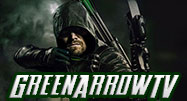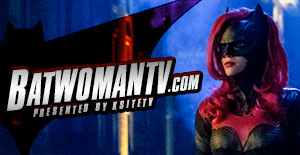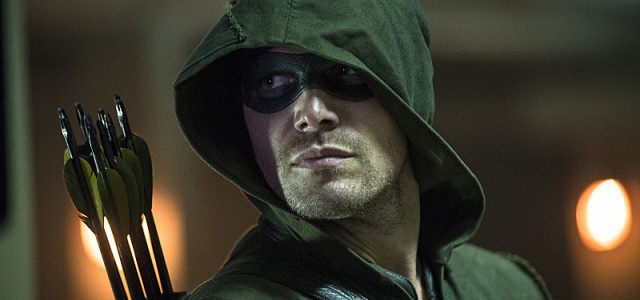
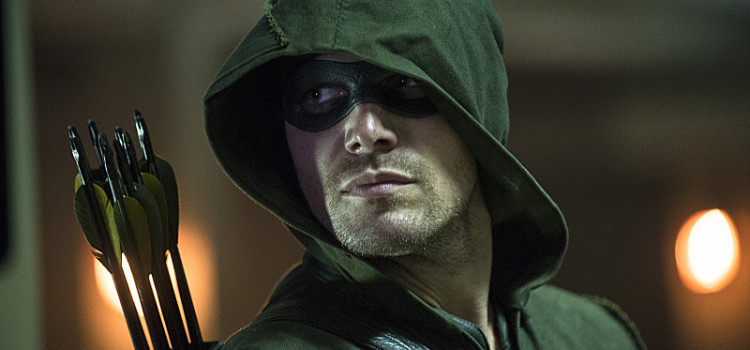
Arrow #3.1 “The Calm” Review (Derek’s View)
Recaps & Reviews October 9, 2014 Derek B. Gayle

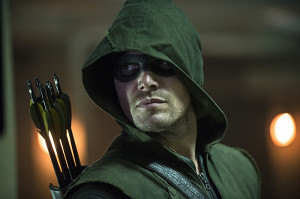 Both of GreenArrowTV’s reviewers are taking on the Arrow season premiere. Check out Matt Tucker’s review here!
Both of GreenArrowTV’s reviewers are taking on the Arrow season premiere. Check out Matt Tucker’s review here!
Summary: A mixed bag of an opening is fun and shocking, resetting the stage for the new but also rehashing some of the old, with troubling implications.
If you have not seen this episode yet and do not wish to be spoiled, do not continue reading!
Review
Arrow’s third season premiere is an interesting microcosm of the show as a whole. While its ending certainly sets up what’s to come in the season, the majority of what happens is more of an epilogue to season 2 than a start to the season’s story.
The most overarching element of this, of course, is Oliver’s attempts be Oliver Queen via his relationship with Felicity and bid for Queen Consolidated, and his subsequent realization that neither can work. The beginnings of “The Calm” are quite fun, with more light-hearted antics and direct comedy than the show has ever done. Oliver “multitasks” and plans a date while on a chase; Felicity has a meet cute with a Ray Palmer that uses “BTW” in his common lingo; and most importantly, everyone seems to generally like each other. Quentin, though not in great shape after his collapse in the finale, is on extremely loyal terms with the Arrow. Diggle and Lyla are in a good spot for their upcoming baby, which Oliver is actually excited about and supporting of. Laurel is working with Team Arrow on the outskirts in a rather clever way, prosecuting the criminals to make sure they can’t snake their way out of the justice system.
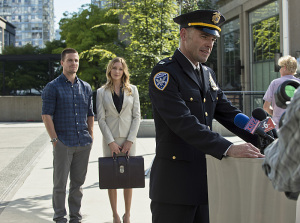 Everything is just dandy, and it makes more sense than it ever has at any other point in the show for Oliver to ask someone out. It’s at first a little disappointing that all the ambiguity from “Unthinkable” regarding Oliver’s true feelings is immediately shed, but there’s admittedly an earnestness here that hasn’t been present in the relationships we’ve seen thus far. Amell plays early-episode Oliver as someone on cloud nine, and whether you’re a fan of the Oliver/Felicity pairing or not, Oliver is a heartwarmingly different man in their pre-date and date scenes. The problem with pairing Oliver up with anyone in the first two seasons of the show was that he was either kind of a dick or kind of insane, too much to see him being a healthy companion for any suitor. Oliver at the beginning of “The Calm” has a level-head and a happy demeanor for the first time in…ever, really. What initially appears to be an attention-grabber to have Oliver and Felicity on their first date comes off much more natural than would be expected, a good testament to the catharsis “Unthinkable” was.
Everything is just dandy, and it makes more sense than it ever has at any other point in the show for Oliver to ask someone out. It’s at first a little disappointing that all the ambiguity from “Unthinkable” regarding Oliver’s true feelings is immediately shed, but there’s admittedly an earnestness here that hasn’t been present in the relationships we’ve seen thus far. Amell plays early-episode Oliver as someone on cloud nine, and whether you’re a fan of the Oliver/Felicity pairing or not, Oliver is a heartwarmingly different man in their pre-date and date scenes. The problem with pairing Oliver up with anyone in the first two seasons of the show was that he was either kind of a dick or kind of insane, too much to see him being a healthy companion for any suitor. Oliver at the beginning of “The Calm” has a level-head and a happy demeanor for the first time in…ever, really. What initially appears to be an attention-grabber to have Oliver and Felicity on their first date comes off much more natural than would be expected, a good testament to the catharsis “Unthinkable” was.
The most unnatural part is, perhaps, some of the retcon-y elements regarding Oliver and Felicity’s relationship. Oliver’s speech about Felicity being the first person he saw as a person is very sweet, and there’s nothing suggesting it’s not true. But one of the beautiful things about Arrow is how much the show has grown in unexpected directions by embracing what’s worked and what hasn’t in subtle and natural ways. One of those things was Felicity’s integration into the core cast, but what didn’t often work during season two was when Oliver and Felicity’s “sparks” were dropped like anvils. Oftentimes romantic teases were all-too-obviously put in front of our faces, which doesn’t work for a relationship that, up until that point, had been quietly developing in the background. So at that, Oliver spelling out how much he always loved Felicity harkens back to him telling Laurel “You know me better than anyone”—it may very well be true and justifiable, but it comes off as a pre-emptive defense mechanism from a creative standpoint, making sure there’s a spelled-out reason for why they’re in love rather than letting the audience infer it.
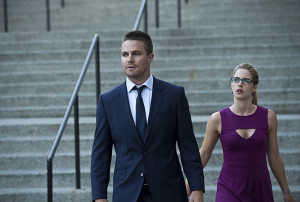 It’s all a bit moot, though, as it’s all set-up for Oliver’s (admittedly depressing) lesson. One upside to Oliver being all openly emotional, other than the opportunity to see Stephen Amell expand beyond the stoicism, is that the soapy and romcom stuff contrasts so heavily with the rest of the episode. Oliver’s battles with the new Vertigo are old school Arrow, perhaps purposefully so, and not just because of the reference to the classic villain. Oliver is right back to shutting people out, calling all the shots, and generally being a dick. The reason for him being a dick, though, is more rooted in his developed care for people—and in a way, he’s right, as Diggle says. People are going to get hurt in this life, and they need to be reminded that they are not obligated to stay.
It’s all a bit moot, though, as it’s all set-up for Oliver’s (admittedly depressing) lesson. One upside to Oliver being all openly emotional, other than the opportunity to see Stephen Amell expand beyond the stoicism, is that the soapy and romcom stuff contrasts so heavily with the rest of the episode. Oliver’s battles with the new Vertigo are old school Arrow, perhaps purposefully so, and not just because of the reference to the classic villain. Oliver is right back to shutting people out, calling all the shots, and generally being a dick. The reason for him being a dick, though, is more rooted in his developed care for people—and in a way, he’s right, as Diggle says. People are going to get hurt in this life, and they need to be reminded that they are not obligated to stay.
What Oliver gets wrong, as he often does, is not leaving them a choice. Oliver has time and time again made contradictory, spur-of-the-moment decisions, so much so that possible errors in writing actually make sense by taking this flaw into account. This is the same Oliver who, in “Unthinkable,” put Felicity in mortal danger as the crux of his plan, and even though she willingly went with it, she technically never had the opportunity to say no given how the plan began. Everything in that episode worked out fine in spite of it, but what Oliver learns in “The Calm” is that things are just as likely to crash and burn as they are to succeed. As the Scarecrow-esque Vertigo shows, the key threat to things crashing and burning is Oliver Queen himself. Everything in “Unthinkable” worked because Oliver was thinking tactically as The Arrow, and things fail in “The Calm” when he tries to be Oliver Queen. As much as he wants to be solid on his decisions, Oliver is definitely confused; when Felicity gives him a cathartic “stop dangling maybes” speech, basically asking him to make up his damn mind, Oliver’s non-answer is a kiss…which probably makes it worse. Not making up his mind is definitely a signature Oliver Queen character flaw, and it’s making him very unfair to Felicity, romantic gestures and all.
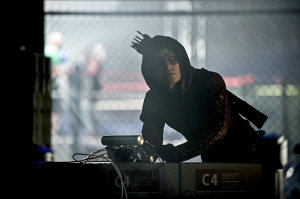 This is some interesting stuff, but it’s a bit of a rehash of what we’ve seen in the past. The end of season one dealt with Oliver learning that he did need people, and could use his care for his loved ones to motivate him. Season 2 had him opening up to his team, admitting to his own flaws, and embracing the good within him. It makes things more tragic that Oliver is inflicting the pain in backtracking on himself, and is sure to change his relationships with Felicity and Diggle from here on out. But that doesn’t take away from the fact that it’s still backtracking for his character. It’s not unnatural, necessarily, but it’s not as interesting going into this season from a character perspective as past premieres have been. Season one, we knew from the start that we were seeing Oliver grow as a better human. Season two, we saw him grow as a hero. So, is season three about growing as a human and a hero…again?
This is some interesting stuff, but it’s a bit of a rehash of what we’ve seen in the past. The end of season one dealt with Oliver learning that he did need people, and could use his care for his loved ones to motivate him. Season 2 had him opening up to his team, admitting to his own flaws, and embracing the good within him. It makes things more tragic that Oliver is inflicting the pain in backtracking on himself, and is sure to change his relationships with Felicity and Diggle from here on out. But that doesn’t take away from the fact that it’s still backtracking for his character. It’s not unnatural, necessarily, but it’s not as interesting going into this season from a character perspective as past premieres have been. Season one, we knew from the start that we were seeing Oliver grow as a better human. Season two, we saw him grow as a hero. So, is season three about growing as a human and a hero…again?
Either way, this does shake-up character dynamics without necessarily shifting the actual status quo. Diggle accepts stepping down from the field role (which would be a much bigger deal if he’d actually been in the field much last season.) David Ramsey will hopefully get more to do with the family raising, though it will be interesting to see how Arrow integrates that kind of storyline into the show. As for Felicity, no one can blame her for going for a rebound guy after Oliver jerks her back and forth, and as evidenced by the meet-cute antagonism with Ray Palmer, it’s not going to take long. Brandon Routh is much more youthful than expected in the role, a pleasant surprise that bodes well for him coming up. His dialogue is a little too cheeky at times, but Routh handles it well considering he hasn’t really ever played this type of role before.
There were some problems with how Felicity was often written last season, often playing far too shrill and petty. But “The Calm,” in spite of any faults with Oliver’s arc, is totally owned by Emily Bett Rickards. Felicity is written well, with funny lines that aren’t too cutesy and tear-downs that are justified. Rickards herself seems more refreshed and refined in the role in general, as evidenced by the dramatic emotional shifts Felicity has throughout. Her quiet reactions in the Arrowcave as Oliver rants about not wanting any connections—right in front of her!—are positively heartbreaking. Felicity didn’t need redemption as much as other characters did, but she’s a greatly improved presence in “The Calm.”
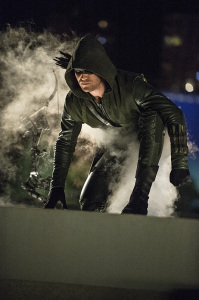 The Vertigo material is a little rushed, and the Scarecrow-modification makes things far too direct. That said, it’s good that the show is embracing one-shot villains that reflect or deeply influence the primary arc or motif of an episode, something seasons one to two didn’t always handle well. Peter Stormare does the best he can with the character, but unlike Seth Gabel’s iteration, he doesn’t have very much to work with.
The Vertigo material is a little rushed, and the Scarecrow-modification makes things far too direct. That said, it’s good that the show is embracing one-shot villains that reflect or deeply influence the primary arc or motif of an episode, something seasons one to two didn’t always handle well. Peter Stormare does the best he can with the character, but unlike Seth Gabel’s iteration, he doesn’t have very much to work with.
“The Calm” very much feels like a singular installment rather than a larger part of the arc, its end more wrapped up than any usual episode. Until, of course, we get to Sara’s brief reintroduction and sudden demise. Frankly, Sara’s return is as out of nowhere as her death, which makes it feel far-too fabricated in the grand scheme of things. Her disturbingly brutal murder, while well-shot, takes away from this episode’s story more than it should; it’s very much a set-up for the season rather than a conclusion for what “The Calm” is trying to say. Yes, the episode is about Oliver’s fear of putting others in danger, but Sara was the exception—she was doing things by her own accord, unrelated to Oliver. If this is supposed to highlight Oliver being in the right and give him guilt for the season, it rings false. And it doesn’t help that Sara’s reappearance feels inorganic and tacked on, bringing her back only because we needed a way to start the season’s big mystery.
It’s also hard to avoid that Sara’s death signals some scary implications for the show in terms of damaging tropes. The “fridging” aspect—a comic book trend which has female characters brutally killed specifically to provide angst for the male characters—is thankfully diluted, at least a bit, with Laurel’s presence in the scene. While it certainly depends on future execution, it implies that this is meant to be more development for her rather than strictly Oliver or Quentin. A potentially meatier role from Nyssa is also welcome as a result. But there’s also a troubling trend of LGBT characters killed in stories, especially many who are bisexual or lesbian. In a lot of ways, Sara was written into a corner at her very conception, and cursed by just how well her character was executed and how much more her arc worked than her canon-Canary sister. Also, how many freaking times she’s “died” already doesn’t help.
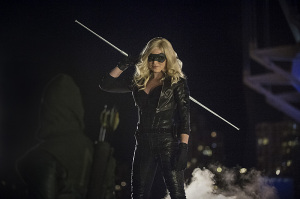 It’s a slippery slope we’re on now, and it all depends on how well her death can resonate. It will surely be vital to this season’s arc, but it’s going to have to represent something more than “Now Laurel is the Canary” and “Now we have the Big Bad” to work. And this will play into Oliver’s arc, of course, but it can’t just be another thing for Oliver to be angry about. There’s a place in these types of stories for violent and generally meaningless deaths, but even that absence of meaning can and should create meaning for the characters and world left behind. Also, from a macro-level, it’s going to be hard to deliver any Lance-related story from here on out without being on thin ice. We put faith in the show last year, and it delivered; the same has to be done now, as this development is less a part of “The Calm”—which is generally successful otherwise—and more its own singular impetus for the season. And who knows, there’s always the Lazarus Pit, right?
It’s a slippery slope we’re on now, and it all depends on how well her death can resonate. It will surely be vital to this season’s arc, but it’s going to have to represent something more than “Now Laurel is the Canary” and “Now we have the Big Bad” to work. And this will play into Oliver’s arc, of course, but it can’t just be another thing for Oliver to be angry about. There’s a place in these types of stories for violent and generally meaningless deaths, but even that absence of meaning can and should create meaning for the characters and world left behind. Also, from a macro-level, it’s going to be hard to deliver any Lance-related story from here on out without being on thin ice. We put faith in the show last year, and it delivered; the same has to be done now, as this development is less a part of “The Calm”—which is generally successful otherwise—and more its own singular impetus for the season. And who knows, there’s always the Lazarus Pit, right?
“The Calm” is a mixed bag at the end of the day, a clear transition episode from season 2’s huge scope to what appears to be a more pointed character story. As its own unit (minus the Sara scene) it crafts a self-inflicted tragic arc for Oliver, a man who’s embraced his role as a hero but is still too scared to take personal risks. It’s hard to see how the show can continue on this path without retreading too much of what it did last season. It’s also sort of a messy episode with how it both handles and sets things up, often bogged down with exposition and too much telling rather than showing. But both of those things also help to quickly set the stage for this new era in the show, and much like “City of Heroes,” it’s very hard to see where the show will go next. Even in light of some troubling developments, at least the show isn’t predictable. And regardless of its flaws, “The Calm” is still the most fun the show has ever been.
Odds & Ends
- So, looks like we’re done with “My name is Oliver Queen” openings forever now?
- We do have a new Chinese-eque title card, with a new arrowhead and sound effect. They both lean a little more on “Hey, we’re gonna do stuff in Hong Kong now!” than they should, considering season 2 just added a more emotional-sounding motif than something this direct. But it’s not a big deal, and we’ll get used to it.
- The delivery of “You have failed this city” somehow did not sound cheesy. It did it! It took two years, but the show finally did it!
- Considering how Hong Kong was the main cliffhanger at the end of last season, and Oliver brings it up directly in the present, the first flashback doesn’t resonate much. The ending sets up a new dynamic, with Oliver’s guard basically being held hostage. But there’s not much else to it, and the “One man cannot live by two names” line is way too heavy-handed. Also, sort of nonsensical in context.
- Is it just me, or is Katie Cassidy’s hair way blonder than usual?
- Felicity sure cleaned up well after that explosion that left her unconscious with a bloody and beat-up face. You’d at least think she’d have a band-aid or something.
- Poor Roy. Oliver is totally okay with keeping him on his team because he has zero connections in the outside of the world now. It’s actually exciting to see what’s going to happen with him at this point, considering we didn’t really get a peek into his current mindset, aside from his wince at hearing Thea’s whereabouts. That said, the Arsenal costume? Awesome. Colton Hayes is lookin’ good.
- Was that Barry scene made before it was known that The Flash would air the day before Arrow? Because it…really doesn’t fit, except as a shoehorned tease to get any laggers to go watch The Flash. Which you totally should if you haven’t.
- Keeping Thea and Malcolm out of the of the premiere is smart. Considering how few hanging threads are left outside of Sara’s death, it’s good that there’s still some other mysteries. Also, it means Thea and Malcolm are viable suspects in the murder. Just sayin’…
- “And I’ve seen you shirtless. Multiple times. Shirtless all the time.”
Derek B. Gayle
Derek B. Gayle is a Virginia native with a BS in English, Journalism and Film from Randolph-Macon College. In addition to being an avid Power Rangers and genre TV fanatic, he also currently co-produces, writes and performs in local theatre, and critically reviews old kids' cartoons. You can check out his portfolio here.
Arrow Reunion Picket Set For August 11
News Aug 4, 2023
Stephen Amell Is Returning To The Arrowverse!
News Jan 8, 2023
Happy Arrowversary!
News Oct 10, 2022
Mia Queen Returns For The CW’s “Armageddon”
News Aug 25, 2021
Arrow Season 8 Blu-ray & DVD Coming April 28
News Feb 5, 2020
End of an Arrow: Thoughts on the Series & Finale
News Jan 28, 2020
